Genesis 2:15-25
15 And the LORD God took the man, and put him into the garden of Eden to dress it and to keep it.
16 And the LORD God commanded the man, saying, Of every tree of the garden thou mayest freely eat:
17 But of the tree of the knowledge of good and evil, thou shalt not eat of it: for in the day that thou eatest thereof thou shalt surely die.
18 And the LORD God said, It is not good that the man should be alone; I will make him an help meet for him.
19 And out of the ground the LORD God formed every beast of the field, and every fowl of the air; and brought them unto Adam to see what he would call them: and whatsoever Adam called every living creature, that was the name thereof.
20 And Adam gave names to all cattle, and to the fowl of the air, and to every beast of the field; but for Adam there was not found an help meet for him.
21 And the LORD God caused a deep sleep to fall upon Adam, and he slept: and he took one of his ribs, and closed up the flesh instead thereof;
22 And the rib, which the LORD God had taken from man, made he a woman, and brought her unto the man.
23 And Adam said, This is now bone of my bones, and flesh of my flesh: she shall be called Woman, because she was taken out of Man.
24 Therefore shall a man leave his father and his mother, and shall cleave unto his wife: and they shall be one flesh.
25 And they were both naked, the man and his wife, and were not ashamed.
Genesis 3:
1 Now the serpent was more subtil than any beast of the field which the LORD God had made. And he said unto the woman, Yea, hath God said, Ye shall not eat of every tree of the garden?
2 And the woman said unto the serpent, We may eat of the fruit of the trees of the garden:
3 But of the fruit of the tree which is in the midst of the garden, God hath said, Ye shall not eat of it, neither shall ye touch it, lest ye die.
4 And the serpent said unto the woman, Ye shall not surely die:
5 For God doth know that in the day ye eat thereof, then your eyes shall be opened, and ye shall be as gods, knowing good and evil.
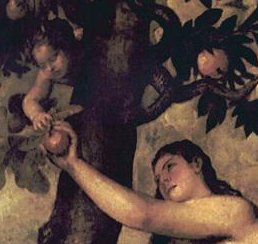 Fall of Man Titian
image taken from
Fall of Man Titian
image taken from
6 And when the woman saw that the tree was good for food, and that it was pleasant to the eyes, and a tree to be desired to make one wise, she took of the fruit thereof, and did eat, and gave also unto her husband with her; and he did eat.
7 And the eyes of them both were opened, and they knew that they were naked; and they sewed fig leaves together, and made themselves aprons.
8 And they heard the voice of the LORD God walking in the garden in the cool of the day: and Adam and his wife hid themselves from the presence of the LORD God amongst the trees of the garden.
9 And the LORD God called unto Adam, and said unto him, Where art thou?
10 And he said, I heard thy voice in the garden, and I was afraid, because I was naked; and I hid myself.
11 And he said, Who told thee that thou wast naked? Hast thou eaten of the tree, whereof I commanded thee that thou shouldest not eat?
12 And the man said, The woman whom thou gavest to be with me, she gave me of the tree, and I did eat.
13 And the LORD God said unto the woman, What is this that thou hast done? And the woman said, The serpent beguiled me, and I did eat.
14 And the LORD God said unto the serpent, Because thou hast done this, thou art cursed above all cattle, and above every beast of the field; upon thy belly shalt thou go, and dust shalt thou eat all the days of thy life:
15 And I will put enmity between thee and the woman, and between thy seed and her seed; it shall bruise thy head, and thou shalt bruise his heel.
16 Unto the woman he said, I will greatly multiply thy sorrow and thy conception; in sorrow thou shalt bring forth children; and thy desire shall be to thy husband, and he shall rule over thee.
17 And unto Adam he said, Because thou hast hearkened unto the voice of thy wife, and hast eaten of the tree, of which I commanded thee, saying, Thou shalt not eat of it: cursed is the ground for thy sake; in sorrow shalt thou eat of it all the days of thy life;
18 Thorns also and thistles shall it bring forth to thee; and thou shalt eat the herb of the field;
19 In the sweat of thy face shalt thou eat bread, till thou return unto the ground; for out of it wast thou taken: for dust thou art, and unto dust shalt thou return.
20 And Adam called his wife's name Eve; because she was the mother of all living.
21 Unto Adam also and to his wife did the LORD God make coats of skins, and clothed them.
22 And the LORD God said, Behold, the man is become as one of us, to know good and evil: and now, lest he put forth his hand, and take also of the tree of life, and eat, and live for ever:
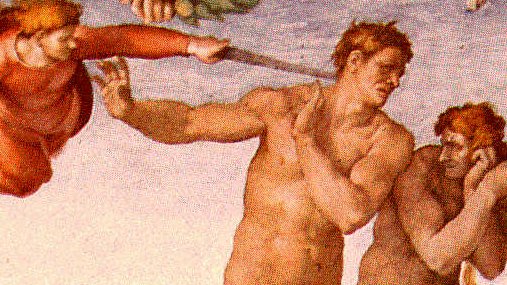 Fall Michelangelo
image taken from
Fall Michelangelo
image taken from
23 Therefore the LORD God sent him forth from the garden of Eden, to till the ground from whence he was taken.
24 So he drove out the man; and he placed at the east of the garden of Eden Cherubims, and a flaming sword which turned every way, to keep the way of the tree of life.
Interpretive Art
"And the serpent said unto the woman, Ye shall not surely die"
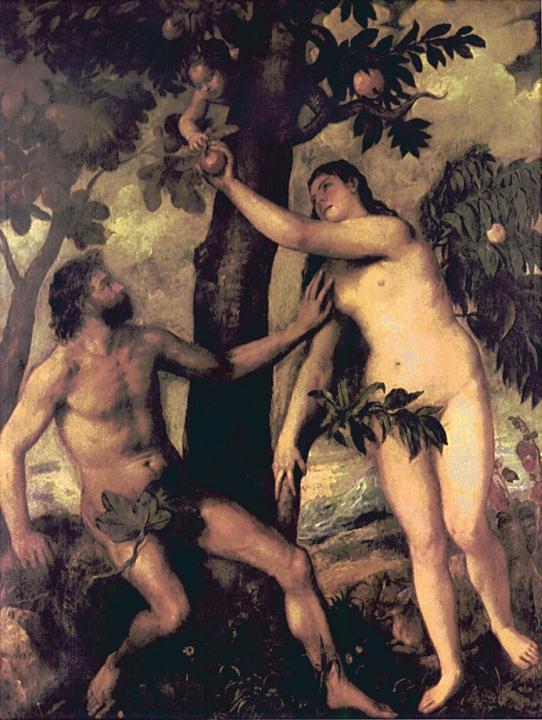 Fall of Man (c.1570) Titian
Fall of Man (c.1570) Titian
In this painting the serpent has the appearance of a child or cherub-like creature. This interpretation shows that Eve is in fact beguiled by the seemingly innocent serpent.
Adam is pictured right next to Eve in this scene with his hand on her breast. He seems to be admiring her while she is in the act of defiance. He does not seem as if he's trying to stop her.
"And the Lord God caused a deep sleep to fall upon Adam, and he slept: and he took one of his ribs and...made he a woman."
 Paradise and Hell (c.1510) Hieronymous Bosch
image taken from
Paradise and Hell (c.1510) Hieronymous Bosch
image taken from
There are three scenes taking place underneath a sky filled with fairly-like angels. In the first scene God creates Eve while Adam sleeps
In the next scene the couple is being tempted by a strange child-like creature. The last scene shows God kicking
Adam and Eve out of the garden. In this last scene fig leaves cover parts of their body where before they were completely
naked. In the second scene Eve is wearing leaves, which seems to be the trend in art works during this time period.
"And when the woman saw that the tree was good for food... and a tree to be desired to make one wise, she took of the fruit"
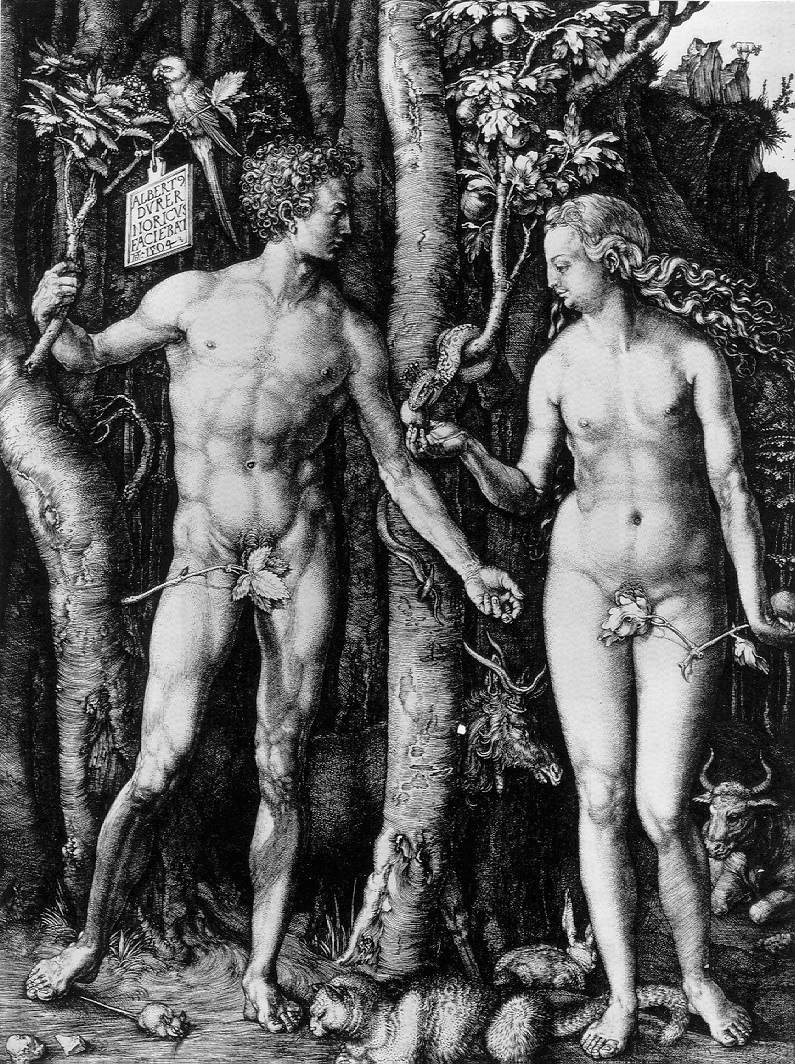 engraving 1504 Albrecht Durer
image taken from
engraving 1504 Albrecht Durer
image taken from
This engraving shows a pastoral scene with a cow in the back ground and small rodents in the foreground.
The type of setting implies relaxation. This time the serpent does appear serpent or snake-like and is actually
giving Eve the apple. Adam doesn't seem to be discouraging her actions.
"Therefore the Lord God sent him forth from the garden of Eden"
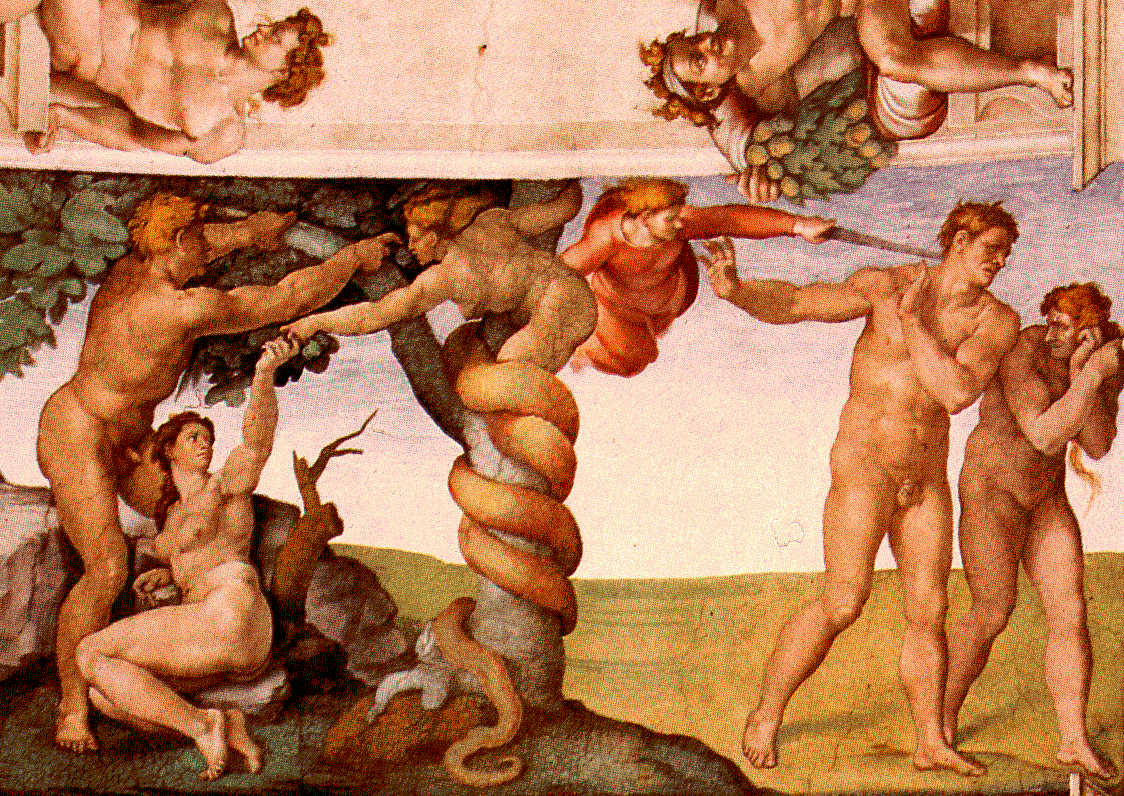 Temptation & Fall Michelangelo
Temptation & Fall Michelangelo
In the Temptation scene the serpent is depicted as half woman and half serpent. Perhaps Michelangelo is
illustrating the cunningness of a woman. Perhaps he's alluding to woman being the cause of the fall of man, yet
Adam is also reaching for an apple but he may also be fooled by the cunning beauty of the serpent woman.
This is the only painting that I could find in which Adam and Eve are not wearing fig leaves, before or after
the temptation.
"Now the serpent was more subtil than any beast of the field which the Lord God had made."
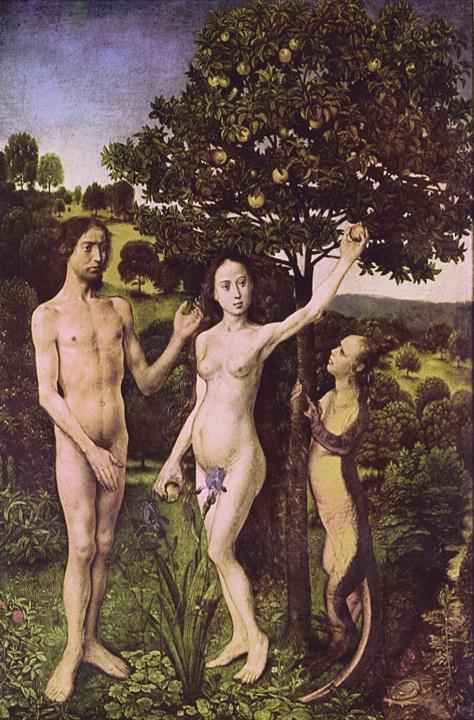 Original Sin (1467/8) Hugo van der Goes
Original Sin (1467/8) Hugo van der Goes
Adam and Eve are shown to be far less masculine than in both Michaelangelo's and Durer's and the serpent actually
appears to be male. The serpent is illustrated as rather frightening--part man and part lizard. Neither Adam and Eve
are paying much attention to him yet he seems pleased that Eve has reached for the fruit.
Themes in Adam and Eve Prevail in Renaissance Literature
The story of Adam and Eve taken from the book of Genesis is filled with themes that are prevalent throughout Renaissance literature namely deceit, power, vengeance and persuasion. It is also the basis for what I feel is one of the most remarkable works written during that time period, Milton's "Paradise Lost."
In Genesis after God creates Adam, he tells him, "Of every tree of the garden thou mayest freely eat:/But of the tree of the knowledge of good and evil" (3:16-17). Yet Adam's "help meet," Eve, is easily manipulated by the serpent to eat of the one tree that they are commanded not to eat of perhaps because of her desire to become like God, knowing good and evil.
In "Paradise Lost," Satan who is disguised as the serpent manipulates Eve. Satan does this in order to get back at God for choosing His Son to be His equal instead of Satan. "Of guile, of hate, of envy, of revenge…the more he sees/Of pleasure not for him ordained: then soon/fierce hate he recollects, and all his thoughts/ Of mischief, gratulating, thus excites" (Book 9: 466, 469-472). Satan chooses Eve to manipulate because she is an easier target in that she is easily flattered. She also doesn't have the strong relationship with God that Adam has because God creats Adam "for God only, shee for God in him" (Book 4: 299). She is supposed to worship God through Adam so I think she is weaker in her trust in God than Adam is. This allows her to accept what the serpent has to say about the goodness of the fruit. He tells her that her eyes shall be "Op'n'd and clear'd, and ye shall be as Gods/ Knowing both Good and Evil" (Book 9: 706-707). The serpent convinces Eve because of her desire to know more, to become more powerful, to become more god-like.
The serpent's deceptiveness in both Genesis and "Paradise Lost" reminds of Iago in Shakespeare's Othello. Like Satan in "Paradise Lost" who wants revenge against God, Iago is jealous and envious and wants revenge against Othello. He says, "I hate the Moor;/And it is thought abroad that twixt my sheets/He's done my office" (1197). He thinks that Othello slept with his wife. Like the serpent, Iago was the tempter that initiated Othello's way of thinking. Iago says, "The Moor is of a free and open nature…And will as tenderly be led by the nose/As asses are" (1197). He planted false evidence such as giving Cassio Desdemona's handkerchief in order to make it look like they were having an affair. He provoked Othello's weakness, which was his obsessive love for Desdemona just like the serpent was able to deceive Eve by knowing her weakness.
The role that God plays in both Genesis and "Paradise Lost" reminds me of Prospero in The Tempest. Prospero is all-powerful on the island and just like God in "Paradise Lost" who watches Adam and Eve below, Prosper knows the plots that are brewing between Sebastian and Antonio and Caliban, Trinculo, and Stephano.
The story of Adam and Eve is filled with issues that have sparked interest since it was written. The King James Bible was commissioned during the early part of the Renaissance period, which no doubt allowed for a more widespread interest and examination of the bible. The story of Adam and Eve has themes that are extensive throughout Renaissance literature in other works written by those such as Ralegh, Donne, and Johnson.